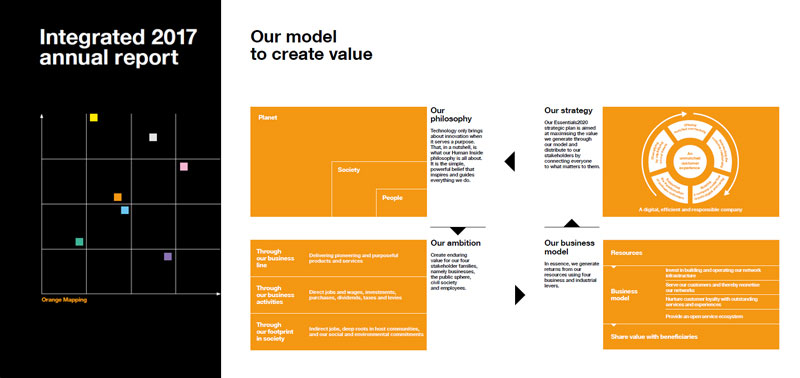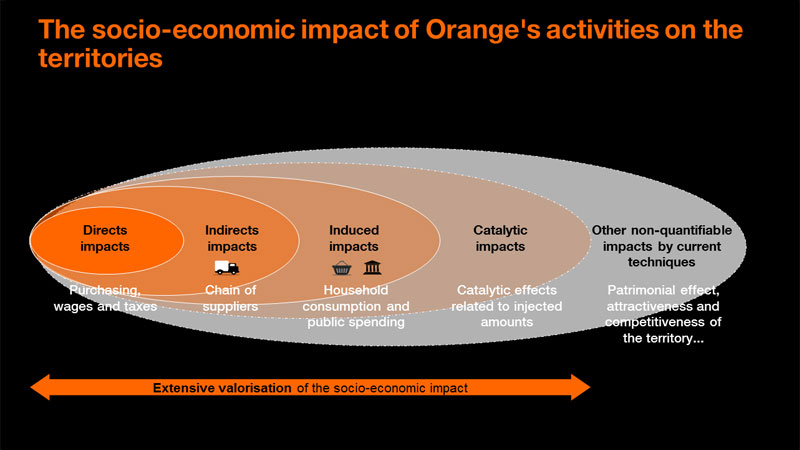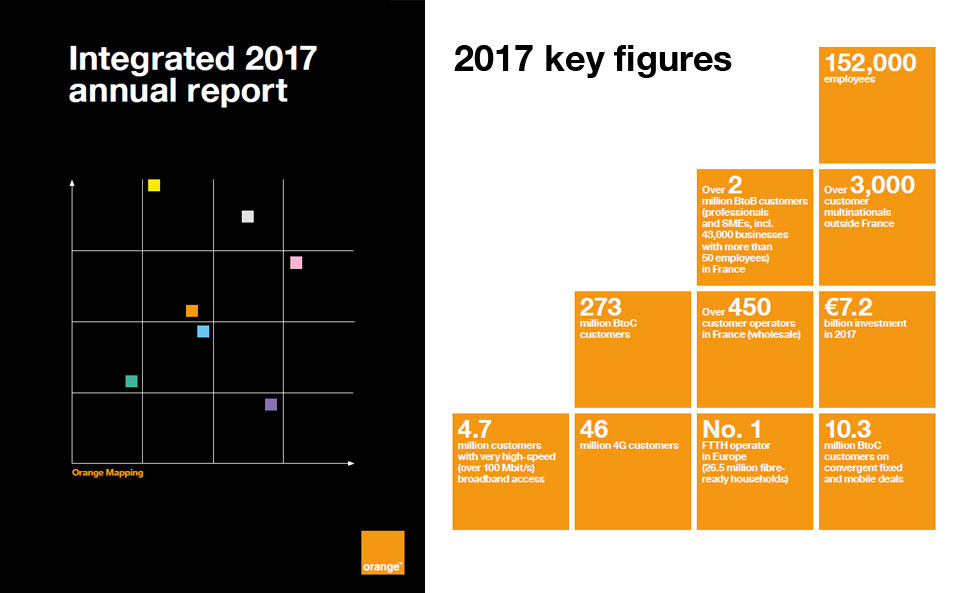Published at 2018, June 29th
As Orange publishes its third annual integrated report, the company has entered a new stage in its responsible reporting policy. As always, readers will find the key financial and non-financial facts and figures of 2017. But we also wanted to make it the most comprehensive and accessible document about our economic and social model: how can an international group like ours create value? And how is this value distributed throughout our ecosystem? Explanations from Brigitte Dumont – Orange Group CSR director
For companies on the stock exchange, the season of AGMs and annual reports provides them with the chance to demonstrate their accountability to their shareholders and investors. It is also the opportunity to reach out to a wider audience about who we are, what we have achieved, and what we hope to achieve. For several years, the more holistic notion of accountability, compared to the purely financial notion of “accounts”, has predominated, as civil society is increasingly attentive and critical about the social role that companies play.
The question of trust
Our individual and institutional shareholders, our clients, employees and suppliers, the regulators and the public authorities all ask the same pressing question about trust: can you prove that your company has aims other than merely seeking to make maximum and immediate profit? Does the company have a long-term plan and is it aware of its place within the ecosystem – both the general environment and society, and the specific sector in which we operate. Are you aware of this reciprocal dependence between economic success, the longevity of the company and the sustainable development of the ecosystems the company interacts with?
I call this a “question of trust” because the performance of a company depends on the credibility of the answer. There can be no economy without exchanges, no exchanges without trust, and no trust without full awareness of the interdependence between the company and its ecosystem.
This interdependence is illustrated by the materiality matrix for the first time in the Orange 2017 integrated annual report. The matrix, created as part of a “dialogue of stakeholders” that has been ongoing since 2009, combines our business objectives with the expectations of our clients, our employees and their representatives, our suppliers and the representatives of civil society, in order to identify and rank our environmental, social, societal, ethical and commercial priorities. This is what guides our Group. To ensure sustainable development, companies need to earn, deserve and maintain the trust of their stakeholders.

What does the notion of ‘value’ cover?
The company must not only prove that its operations do not harm individuals, society and the planet, it must also prove that those operations are beneficial to them. What is the purpose of a company if it adds nothing to its ecosystem? Not even a few jobs, wealth, services, infrastructure, links, facility, well-being or even simply pleasure?
Here are just a few of the possible meanings of the word ‘value’. The main objective that Orange has set out to achieve in this third integrated annual report is to demonstrate the involvement of its teams on a daily basis and show how their professional commitment results in the creation of value for all our stakeholders ‑throughout our ecosystem.
I believe this is an innovative exercise that is still quite rare among companies as big as Orange. We have designed this document as a reporting tool using the best international standards. It also allows us to ensure the fulfilment of our commitments and obligations, similar to the publication of our first Vigilance Plan. The plan – applicable to all our companies and created following extensive work with our internal and external stakeholders – covers the first five obligations listed in the recent ‘duty of care’ law in terms of risk mapping, assessment, prevention, alert and monitoring, be they operational, regulatory or strategic in nature.
Assessing our economic and social impact
Above all, we designed this integrated annual report as a guide to our value creation model. Readers will discover the path taken by all our operations: how our Human Inside philosophy translates as an ambition that justifies an economic model which itself is implemented according to the Essentiels2020 strategic plan to optimise value creation and distribution. This is done with a new presentation of our impact, and in particular the summary of two analyses led by Goodwill Management and Utopies to assess the economic and social effects of our activity in France and Niger.

Looking beyond this, all of our actions and achievements in 2017 are presented from the angle of the benefits for stakeholders. Networks and connectivity, customer experience, digital uses, the digital transformation of companies, a digital and human-centric employer, responsible commitment, collaborative innovation: these are the seven families of objectives closely tied to the fourth industrial revolution brought about by digital technology, that illustrate the Orange experience and our ability to create value that is shared by all.
As explained by Stéphane Richard, CEO of Orange, in this report, “The rules have changed for companies. Access to information in real time and dialogue led by the boom of social media have reinforced the demand for transparency and responsibility.” Companies are now at the forefront of the public debate, and the most appreciated and legitimate of them speak openly and make commitments as corporate citizens. “Orange is different to all other companies owing to its heritage, commitment, and vision. This is an opportunity for us,” explains Stéphane Richard. With this third integrated annual report, we wanted to highlight this difference to show who we are and use that as a strength. The report for the first time describes in detail and with ample evidence everything that makes up the identity and uniqueness of our Group. Everything behind our ability to make a positive difference to the lives of our customers, employees, partners and society as a whole.

